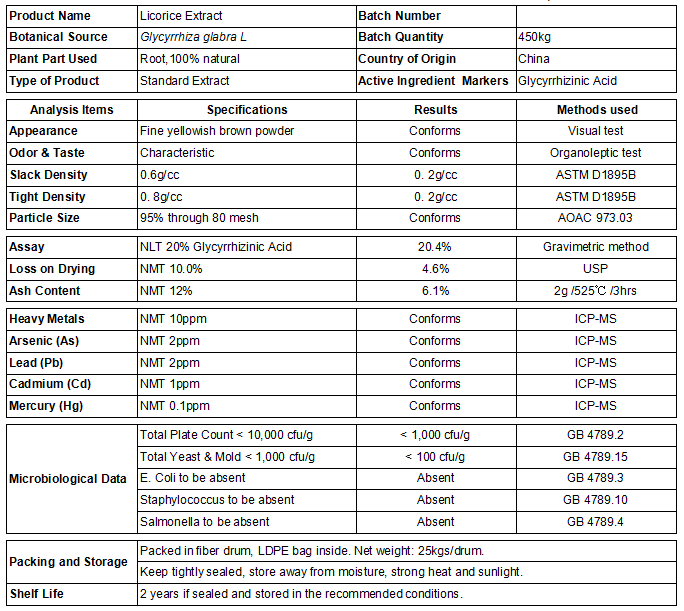T: +86-731-89865681
E: info@kingherbs.com
E: info@kingherbs.com
27Fl, Blding A, Cimen Fun City, Wanjiali Road, Changsha 410014, Hunan, China
| Availability: | |
|---|---|
| Quantity: | |
Description
Licorice extract is a concentrate of active ingredients extracted from the roots and rhizomes of the leguminous plant licorice (Glyphyrrhiza uralensis or Glycyrrhiza glabra). It is rich in glycyrrhizic acid (glycyrrhizin), flavonoids, polysaccharides, etc. and has a wide range of medicinal and industrial values. Kingherbs Limited provides Licorice Extract
The Major Chemical Composition
1. Glycyrrhizin;
2. Glycyrrhizic acid;
3. Glycyrrhizin-like flavonoids;
4. Postcoccinum bisabololol;
5. Acanthopanaxanthin.


Function:
1. Cosmetics and Skincare:
Licorice extract’s anti-inflammatory and antioxidant properties make it a popular ingredient in skincare and cosmetic products, including creams, lotions, serums, and masks;
2. Food and Beverages:
Licorice extract is commonly used as a flavoring agent in candies, desserts, beverages (like herbal teas), and chewing gums;
3. Pharmaceuticals:
Due to its potential health benefits, licorice extract is utilized in pharmaceutical products such as cough syrups, throat lozenges, and digestive aids;
4. Traditional Medicine:
Licorice has been used in traditional medicine systems like Ayurveda and Chinese medicine for its potential benefits in treating certain conditions, including respiratory issues, digestive disorders, and skin problems;
5. Nutraceuticals:
Licorice extract is also incorporated into nutraceutical products, such as dietary supplements and herbal remedies, due to its reputed medicinal properties.
Description
Licorice extract is a concentrate of active ingredients extracted from the roots and rhizomes of the leguminous plant licorice (Glyphyrrhiza uralensis or Glycyrrhiza glabra). It is rich in glycyrrhizic acid (glycyrrhizin), flavonoids, polysaccharides, etc. and has a wide range of medicinal and industrial values. Kingherbs Limited provides Licorice Extract
The Major Chemical Composition
1. Glycyrrhizin;
2. Glycyrrhizic acid;
3. Glycyrrhizin-like flavonoids;
4. Postcoccinum bisabololol;
5. Acanthopanaxanthin.


Function:
1. Cosmetics and Skincare:
Licorice extract’s anti-inflammatory and antioxidant properties make it a popular ingredient in skincare and cosmetic products, including creams, lotions, serums, and masks;
2. Food and Beverages:
Licorice extract is commonly used as a flavoring agent in candies, desserts, beverages (like herbal teas), and chewing gums;
3. Pharmaceuticals:
Due to its potential health benefits, licorice extract is utilized in pharmaceutical products such as cough syrups, throat lozenges, and digestive aids;
4. Traditional Medicine:
Licorice has been used in traditional medicine systems like Ayurveda and Chinese medicine for its potential benefits in treating certain conditions, including respiratory issues, digestive disorders, and skin problems;
5. Nutraceuticals:
Licorice extract is also incorporated into nutraceutical products, such as dietary supplements and herbal remedies, due to its reputed medicinal properties.